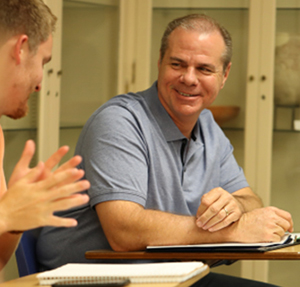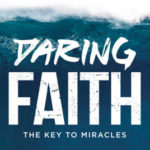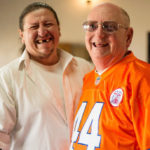WACO—Kevin Harmon parked his truck, grabbed his backpack from the passenger seat, threw it over his shoulder and walked onto the Baylor University campus as a sophomore at the beginning of the fall 2012 semester.
Thousands of other Baylor sophomores returned to the classroom that fall after three months of summer break. Harmon returned to the classroom after three decades of life— nearly 30 years of marriage to his wife, Janice; helping raise two grown sons; and launching a successful career as the co-owner of Air Control, a Central Texas air-conditioning business.
Harmon earned his associate’s degree when Ronald Reagan was president and VCRs had market value, but he always hoped to finish his bachelor’s degree. As a younger man, he said, he wanted to be an engineer. As the years passed, his focus changed.
“When I decided to go back to school, I was more focused on my service at the church,” Harmon said. “That was my interest. It wasn’t engineering anymore. It was to learn about God and the church and the ministry.”
This spring—five years after returning to school—Harmon, now 51, graduates with his bachelor’s degree in recreation and leisure services (recreational ministry) and a minor in business administration.
“He wanted to go back to school to put himself in a position to relate more intimately with his children, and to give him the skills needed to follow an avocational call—to use recreation and sports as a method of ministry in the next chapter of his life,” said Dale Connally, professor and director of Baylor’s recreation and leisure services program “His intentions gave him a passion and a focus that made him easy to teach.”
Difference in age sparked discussions
For a nontraditional student like Harmon, it was common to be the oldest person in the classroom—several decades older than most of his fellow students, and sometimes older than his professors.
 Kevin Harmon of Belton speaks to fellow students during class. Harmon, now 51, returned to school in 2012, 30 years after first attempting a bachelor’s degree. (Robert Rogers/Baylor Marketing & Communications)The age difference and his deep well of life experiences sparked valuable discussions, he said.
Kevin Harmon of Belton speaks to fellow students during class. Harmon, now 51, returned to school in 2012, 30 years after first attempting a bachelor’s degree. (Robert Rogers/Baylor Marketing & Communications)The age difference and his deep well of life experiences sparked valuable discussions, he said.
Sign up for our weekly edition and get all our headlines in your inbox on Thursdays
“Some of the business classes I’ve taken, the professors will explain something in the class, and then they look over at me and say, ‘Is that right, Kevin?’” he said, laughing. “The professors and the students have been very respectful of my experiences in life.”
And Harmon has learned from his fellow students.
“I think the students here are brilliant compared to when I was going to college originally,” he said. “They’re just so smart. They have this heart to serve. … It’s neat to see that. It’s neat to see this generation that everybody calls the Millennials, who some people have said may not want to work, actually have the heart to serve.”
Some students called him “Mr. Harmon.” Some were intrigued by his story and his drive to achieve his goal. Some simply wanted to talk.
“I had a student who I was in class with three years ago text me recently and ask how I was doing,” Harmon said. “He’s already graduated, but we had a conversation about getting connected with a church where he’s living, and that it’s important. He thanked me for that.”
The age difference was clearly evident in one class—fitness theory and practice. During the class, students had to compete in various physical challenges.
“Basically it was me, this old man, having to compete athletically with these young people,” Harmon said. “We had to do challenges together. I think I surprised some of them with my conditioning, but I certainly wasn’t as fast, and the next day I might’ve walked with a limp. They were very supportive of me, though.”
Connally noted having nontraditional students like Harmon in his classes is challenging and rewarding.
“With most of them, I have a moment where I ask myself, ‘What can I really teach to this student who is already successful in a career?’” he said. “It has been an honor to teach them in a manner that was sensitive to their experiences, but at the same time mashing their intellectual buttons to think differently or more broadly about professional and ethical issues, to broaden their network and to watch them flourish in their calling. And it is great for me at this point to have students who understand references in class to Seinfeld, or Presidents Reagan and Clinton.”
Recreational ministry applicable in multiple settings
Recreational ministry is a broad field that can be tailored by a student’s work ethic, academic preparation, flexibility and strength of networking, Connally said.
Baylor’s church recreation students are ministering at Christian camps and serving on church staffs throughout the nation. Others are serving at parachurch nonprofits such as Young Life and Fellowship of Christian Athletes.
“We look for students who are eager to learn some of the social psychology and technical skills associated with managing successful recreation programs,” Connally said. “In addition, we look for students who have a creative curiosity about how they can use their love for the outdoors, sports or recreation to meet clients’ needs as an outgrowth and application of their Christian faith.”
For his part, Harmon has found his passion in the local church. He is a deacon and adult life group leader at First Baptist Church in Temple. Since he began the degree program, he has helped his church organize a number of recreational activities—children’s sports camps, fine arts camps and elements of the youth ministry.
“Kevin desires to help students to have an opportunity to hear the gospel and understands that there are many ways to facilitate that,” said Jim Siegel, youth minister at First Baptist Church of Temple. “Whether it is agreeing to drive the students in a church vehicle, planning a time of recreation to engage the students to connect them with their peers and open their hearts, or just being there to assist in crowd control so that the gospel can be clearly heard and understood, Kevin is willing to do what it takes.”
Harmon has seen immense value in recreation programs as outreach opportunities. He said he sees it firsthand each Wednesday night during First Temple’s youth ministry time, which includes a Bible lesson, group activities and what some claim is the city’s biggest and best weekly dodgeball game.
“Recreation fits everyone’s life, whether they’re church members or not,” Harmon said. “You’re bringing people in. A lot of those students who are coming in aren’t members of our church, and they’re being invited by students from their schools. Their families don’t come to our church, but they’re coming to participate. It’s a great outreach.”
Powerful drive to finish what he started
When Harmon hit the reset button on his college career five years ago, he had more than 90 credit hours to complete. For many—especially those who are going to school part time—the task can seem insurmountable.
Harmon ate the elephant one bite at a time, he noted, taking two or more classes each semester, doing his required internships during the summer months—peak time for the air-conditioning business. It wasn’t easy, he acknowledged. He made sacrifices.
“Time. Time that I can’t spend with the family. And I can’t do my job 100 percent like I think I should,” he admitted. “You just have to sacrifice. For example, this week, I was up to 1:30 in the morning finishing a project. It was a group project—and you know how group projects are.”
He said his family—wife, Janice, sons, Weston and Dawson, and their wives—have been supportive from the moment he announced his intention to return to school and through subsequent years. He’s also found support among his friends and peers.
“I had people say, ‘I think that’s admirable, but why?’” he said. “I tell them it was a goal of mine 30 years ago, and it’s still a goal of mine today. That piece of paper’s not going to change my life the next day, but it’s a goal I set, and I’ve placed a lot of value on achieving the thing that I told myself I was going to do.”
Harmon enjoyed his student identity.
“We often joked that my wife was dating a college student,” he said.
Now, she’s married to a college graduate.
“Kevin is like the Energizer bunny—always going and going,” Janice Harmon said. “Getting his diploma has always been a goal and on his bucket list. Although his degree goal has changed, he wanted to finish and get that piece of paper. It was tough balancing school, work, church and home life, but he stuck with it and finished strong. He loved learning and mentoring other students.”
Desired a school with a clear Christian mission
A National Guard veteran, Harmon said he could’ve chosen to attend other schools and used his benefits at those institutions. He chose Baylor University because of its Christian mission.
“I looked at other colleges. I’ve got some military benefits. I could’ve gone to a state school and had all my school paid for. I chose to come to a Christian school,” he said.
His Baylor University experience and his degree have deepened his passion for local- church ministry, Harmon said.
“When I came back to school, some people asked me what I was going to do once I got my degree,” he said. “I want to continue working in the church. I think God will use what I’ve learned to benefit his kingdom. My goal is to continue to volunteer at the church and whatever that ministry might look like.”















We seek to connect God’s story and God’s people around the world. To learn more about God’s story, click here.
Send comments and feedback to Eric Black, our editor. For comments to be published, please specify “letter to the editor.” Maximum length for publication is 300 words.